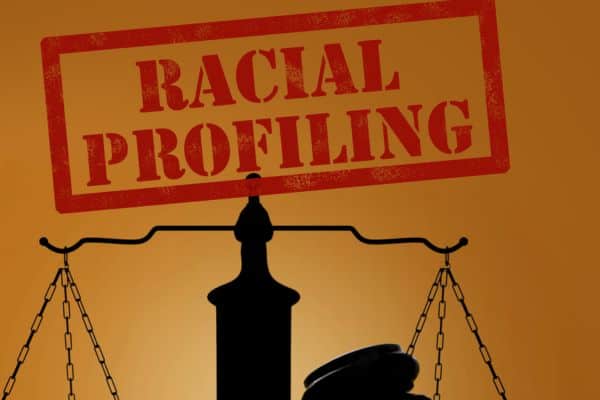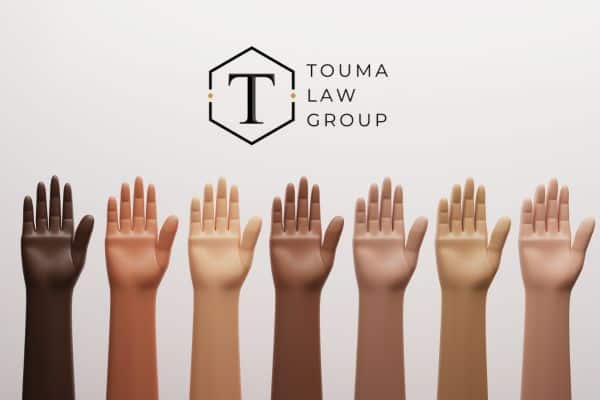If racially profiled as a black driver by police in South Carolina, remain calm and avoid confrontation. You have the constitutional right to remain silent and not answer questions. Assert your right politely but firmly. Only give information if detained or arrested. Remember the patrol car and badge numbers of the officers involved. This can be used for accountability in civil lawsuits if any wrongdoing or unreasonable searches occur.
Ask for an attorney right away if arrested. Individuals are entitled to legal representation, regardless of the severity of the incident or absence of criminal charges. You do not have to answer questions without an attorney present. If you believe you have been racially profiled as an African American, it is recommended to document the incident.

Write down everything, including car and badge numbers. You can file a complaint or contact Touma Law Group today and speak to a knowledgeable criminal defense attorney for a free consultation!
What it Means to be a Victim of Racial Profiling
Traffic stop statistics indicate that there is an ongoing issue of racial profiling in the United States. Racial profiling is the act of using a person’s race or ethnicity, such as African Americans, as the sole basis for determining police attention, resulting in increased scrutiny of certain minority groups. Studies show that black people experience a higher likelihood of being victims of police misconduct during reasonable suspicion traffic stops, in contrast to white drivers.

Since the 9/11 attacks, individuals of Middle Eastern descent have been more likely to be subjected to profiling by law enforcement. However, other national origin demographics are also victims of police brutality and false imprisonment.
Racial profiling goes against our nation’s foundational values of equal protection under the law and mutual respect between people regardless of race or ethnicity. Proactive steps must be taken by law enforcement and legislation passed to prevent this illegal police practice. We should strive towards eradicating racial disparities and prejudice.
Overview of South Carolina’s Victim of Racial Profiling Laws
South Carolina has laws in place to protect individuals from being racially profiled by police. In 2008, the state legislature passed a law that prohibits officers from using race or ethnicity as the sole factor in deciding whether to stop and search someone for illegal drugs or drug trafficking. The law also requires detailed police reports and data to be collected on those stopped and/or searched for drug charges, which must be reported to the state’s Law Enforcement Division for analysis.
Recently, in 2019, South Carolina passed another law requiring all law enforcement agencies to adopt a written policy against racial profiling abuse by police that outlines expectations for officer interactions with people of all races and ethnicities.
Before the Traffic Stop
It is advised to take precautions when facing potential racial profiling by police during a traffic stop in South Carolina. Stay calm and respectful even if your rights feel violated. Know your rights and write down everything that happens, including officer badges and car numbers. File a complaint with SLED or seek legal advice from a criminal defense lawyer for an excessive force lawsuit if necessary.
Record and Document Everything
If you experience racial profiling and wish to report claims of police brutality in South Carolina, record everything – date, time, badge and patrol car numbers, witnesses, and evidence. This will help your experienced police brutality lawyer from Touma Law Group create legal solutions for your case.

Know Your Rights During a Stop
Knowing your rights when stopped by police in South Carolina is crucial, especially if you feel racially profiled. You have legal protections and 4th amendment rights when dealing with police agencies. Stay calm, be polite, and remember you don’t have to answer police officials’ questions. Individuals have the right to decline a search without a warrant and are legally allowed to record interactions with police officers.
During the Traffic Stop
If you are the victim of a discriminatory traffic stop, especially by white police officers during a traffic stop in South Carolina stay calm. If they accuse you of an alleged traffic infraction don’t argue.
Stay Calm and Follow the Instructions
Stay calm and follow instructions if you experience racial profiling by police in South Carolina. Keep your hands off the steering wheel and comply with requests, including providing ID or paperwork quickly. You have the right to record interactions with law enforcement officers.
Refrain from Arguing with the Officer(s)
Stay calm and don’t argue. File a complaint with the police district later.
After the Traffic Stop
In cases of improper police activities, it is important to file a complaint. If you are a victim of police brutality resulting in physical violence or sexual misconduct, it is recommended to seek immediate medical attention.

Take Notes About What Happened During The Stop
If you have been the victim of police abuse of power write down details like the date, time, location, the type of police misconduct, and officers involved. Record what happened before and during the stop, and gather evidence if possible.
How To File a Complaint Against An Officer
To report abuse of authority by a police officer file a complaint. This can hold the officer accountable and prevent future incidents of race-based profiling.
Go to The Local Police Department or Sheriff’s Office
If racially profiled file a complaint at the local police department or sheriff’s office. In the incident report include details of abuse against people and any witnesses to support your claim.
Contact Internal Affairs/Civilian Review Board
To address concerns about misconduct by law enforcement officials, it is recommended to contact the Internal Affairs or Civilian Review Board of the police department for investigation of complaints.
Have an Attorney Represent You in Filing A Claim
To take legal action against officials in law enforcement find a lawyer with experience in lawsuits for this matter. Your lawyer will assess your case and assist you in filing a claim against the police department or officers.

File a Report With The Department of Justice
To report racial profiling by police in South Carolina, file a report with the Department of Justice. They have an online system for this purpose. Fill out the Civil Rights Complaint Form with incident details. Submit it quickly and the DOJ will investigate.
Pursue Legal Action if Necessary
In the event of suspected racial profiling, it is important to be aware of your rights and take appropriate measures. Collect evidence and witness contact information. Contact a civil rights attorney. They can assess your case and suggest the best plan of action, such as filing a complaint or claim in court.
Other Ways to Fight Racial Profiling
If you experience racial profiling by police in South Carolina, you can report it to local authorities or organizations like the ACLU of South Carolina to address the discrimination.
Educate Yourself On Your Rights
Learn your rights to protect yourself during interactions with law enforcement.
Speak Out Against Racial Profiling
If you’ve been racially profiled by South Carolina police, speak out against it. Racial profiling is unjust and illegal in South Carolina. Join an organization fighting against it, write about your experience in the local paper, or attend a rally.
For victims who have gone through the terrible ordeal of police brutality call Touma Law Group for the best legal assistance. Call today at (864) 618-2323 and speak to an experienced attorney for FREE!


